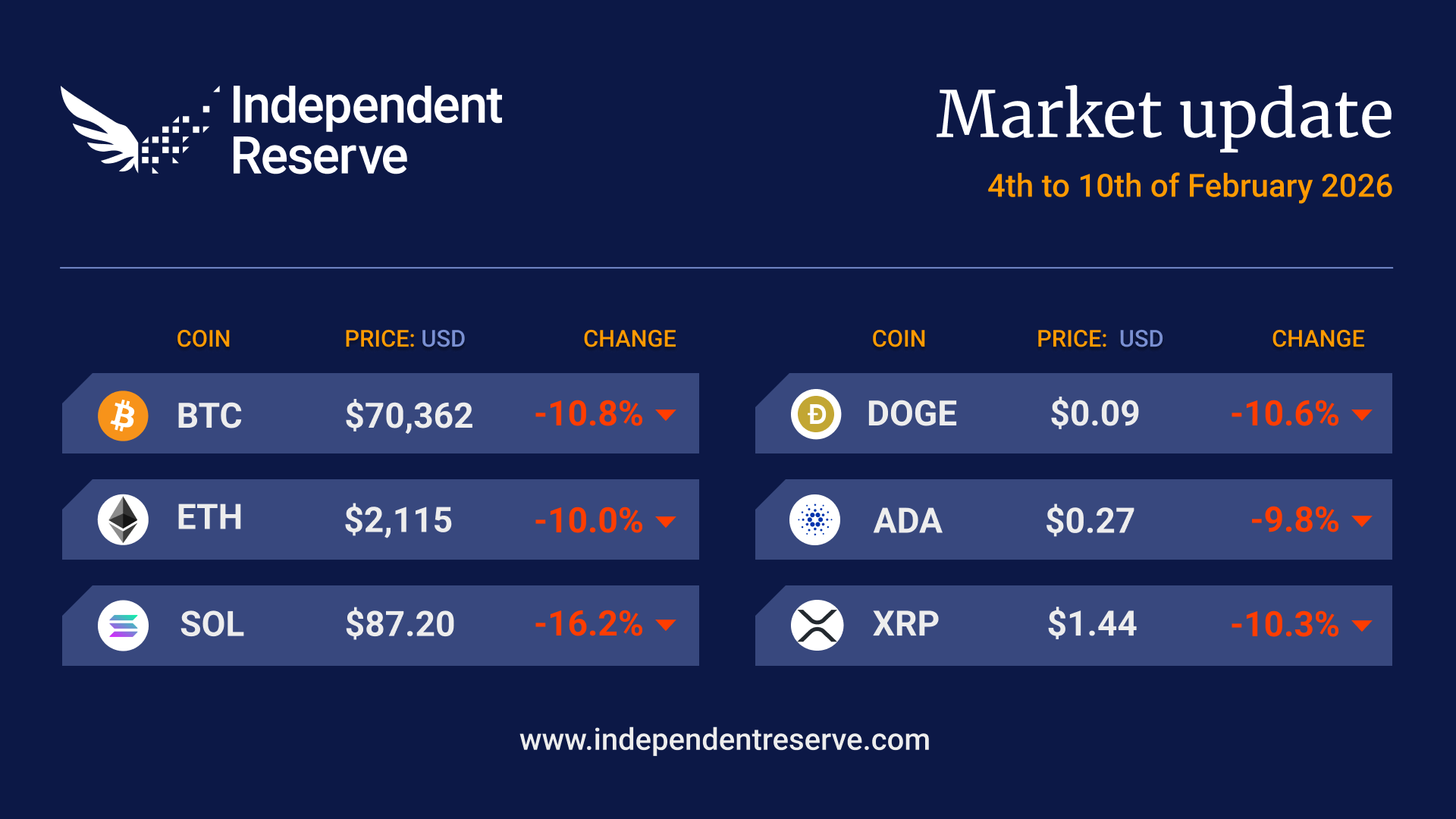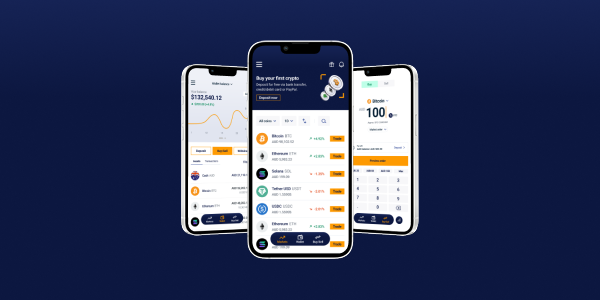In markets
With the excitement over the launch of Ether Futures ETFs lasting less than 24 hours after a short-lived spike, markets have continued their familiar boring grind. Bitcoin finished the week where it began at A$43,100 (US$27,600), but Ethereum lost 5.5%, presumably due to the somewhat disappointing volumes of the futures ETFs and is now trading around A$2,461 (US$1,580). XRP lost 2%, Solana fell 4%, Cardano lost 3%, and Dogecoin was down 4%. The Crypto Fear and Greed index remains stuck at 50, or Neutral.

From the OTC desk
Risk assets, including cryptocurrencies, will pay close attention to the sudden escalation of military conflict in the Middle East. With broadcasting screens being filled with terrifying and unsettling imagery of conflict not seen in such a capacity since the 1970s, the history of the 1973 oil price shock is well-versed among global commodity traders. Cryptocurrencies were obviously not around at that time, however, so their participation and movement under an oil price shock, or extended Middle Eastern conflict, would be new ground for the complex.
An additional complication of any sudden increase in the price of global oil is the secondary effect on long-end bond yields – and the potential for ongoing rhetoric of higher for longer global monetary policy settings.
Last week, the price of crude oil fell from circa USD $92/Bbl to USD $82/Bbl. This relief was noted through a softening in the US Dollar index (down 0.75% on the week as expressed by the .DXY). There was also a corresponding intra-week fall in the US 10-year bond yield from a high of 4.865% to 4.80% on Friday’s close.
US non-farm payrolls (NFP) for September were released on Friday evening, recording +336k additional jobs – significantly more than the market expectation of 170k. Despite this strength, the unemployment rate remained unchanged at 3.8%. Average hourly earnings continued their move lower, coming in at 4.2% YoY versus a market expectation of 4.3% YoY. This would suggest that labour market slack has been maintained and that the speed of wage increases is slowly softening – a key input for the inflation series.
This week’s data includes: US PPI for September (Wednesday 11:30pm AEDT); FOMC Minutes (Thursday 5:00am AEDT); and US Inflation for September (Thursday 11:30pm AEDT)
On the OTC desk, the appetite for small market capital tokens continues to build. This profiles nicely against the increasing demand for USDT, which has consistently traded above its 1:1 USD peg. In general, there remains an ongoing discussion about the relationship between layer 2 networks and what the future landscape may look like for alternate layer 1 operators (alternate to ETH). It is hypothesised that the lack of clarity surrounding the future structure of layer 2s has detracted from layer 1 token buying during this period – food for thought.
ETH/BTC continues its move lower year to date, highlighting BTC price dominance. Opening 2023 at 0.0722 ETH/BTC now trades more than 20% lower on the spread at circa 0.0573. In assessing the historical trading patterns, positive price action has tended to arrive in three phases: 1) BTC outperformance, 2) ETH outperformance, 3) Alt outperformance. This year, we appear to remain in phase 1.
Volatility in both BTC and ETH remains firmly aligned with any SEC or legal announcement regarding a US spot BTC ETF. We expect this to continue in the short term.
For any further information, please feel free to reach out.
In headlines
OTC desk extended hours
Independent Reserve’s OTC desk will now operate from 9am to 7pm AEDT on business days. For our Singapore customers, this should be welcome news; we’re now open from 6am to 4pm. As always, if you have any questions about how the desk works or how we can help you, please contact our friendly team for more information.
SBF’s trial kicks off: math boy or bad guy?
Crypto’s trial of the century made international headlines this week as Sam Bankman Fried’s former FTX and Alameda colleagues, investors and customers lined up to testify against him. The defence is trying to argue that Bankman-Fried is a naïve idealist who just made a few mistakes, while the prosecution is painting him as a greedy evil genius who “lied to the world” to enrich himself, costing investors billions. The Guardian summed up the trial’s key question as: “Math nerd or crypto criminal?” If he’s just a math nerd, though, he’s a pretty reckless one. Cofounder Gary Wang, who stitched up a deal with prosecutors, told the court: “I’m here because I committed wire fraud, securities fraud and commodities fraud.” Wang said that SBF’s other company Alameda Research had been given a $65 billion (A$102B) line of credit on the exchange using customer funds and had been exempted from ever getting liquidated. The defence argues the inexperienced SBF thought this was perfectly legal and that “Sam did not steal from anyone.” Alameda CEO and SBF’s old girlfriend Caroline Ellison takes the stand on October 10 in the US. “His girlfriend will tell you how they stole money together,” Assistant United States Attorney Thane Rehn promised the jurors.

Celsius boss in various degrees of hot water
Another of the last cycle’s villains going through the judicial process is Celsius founder Alex Mashinsky. He is now set to be tried in September next year on charges of fraud and market manipulation. The crypto lending company filed for bankruptcy in July last year and Mashinksy has been accused of defrauding investors out of billions, with the CFTC and SEC also after him.
SEC’s Ripple appeal is denied
District Judge Analisa Torres has reviewed all the evidence and decided that, on reflection, she was right all along, rejecting the SEC’s application for an interlocutory appeal against her ruling that XRP was not a security when sold to retail on exchanges. Judge Torres said the SEC had failed to show there were controlling questions of law or that there were substantial grounds for a difference of opinion. Other issues in the case will still go to trial in April next year, and the SEC may still be able to appeal the whole case after. However, it may be in the SEC’s interest to settle the case. Entrepreneurial Fellow at the ANU College of Law, Scott Chamberlain, predicts: “This case settles before the trial starts in April 2024. There’s not enough meat left on the bone, and this decision gives SEC everything it needs to prevent the case from being a precedent that exchanged-based sales are never investment contracts.”
Bitcoin needs the Fed for a new bull run
There always seems to be a certain degree of speculation about a recession coming in the US, but of late, such talk has increased. Analyst Nicholas Merten says that Bitcoin could collapse by almost 50% if there is a prolonged economic downturn. He also thinks that Bitcoin’s sideways price action since March indicates there is not going to be a new bull market until the Federal Reserve starts increasing liquidity to prop up markets. “At the end of the day, Bitcoin does best when there are increases in the money supply and there is essentially an increase in risk-on mentality and none of those are happening right now,” he said.
Risk is melting away
Binance’s run-in with US regulators and subsequent loss of payment providers both in Australia and in different parts of the world has seen it lose great swathes of market share for the seventh month in a row now. At its peak, Binance accounted for around 70% of the global spot crypto trading volume, but that fell to 38.5% in August and then dipped further to 34.3% in September, according to CCData. Binance’s share of the derivatives trading market also fell during the month from 53.5% to 51.5%. An optimistic way to view this is that the market is starting to derisk from the possibility that Binance’s regulatory woes could result in it shutting down or collapsing. In related news, Binance’s BNB Chain is also losing support at a rate of knots, with Total Value Locked on the DeFi platform falling from US$4.65B (A$7.32B) at the start of the year down to US$2.8B (A$4.4B) today.
Bitcoin is the year’s best-performing asset despite a dodgy quarter
A third-quarter report from NYDIG points out that despite Bitcoin pulling back 11.1% since June, its 63.3% year-to-date return still beats any other asset class in the US. The second-best performer after Bitcoin is US large-cap growth stocks with gains of 28.2%, while the overall US stock market is only up 12.2%, and gold is up a tiny 1.1%. Digital gold is clearly superior in 2023, at least.

Bitcoin ETF will definitely probably happen
The signs are improving that the SEC will approve a spot Bitcoin ETF at some point. ARK Invest CEO Cathie Wood, whose firm has partnered with 21Shares to launch one, says the odds are improving. “We think it is increasingly likely that it will be approved,” she said. Former BlackRock managing director Steven Schoenfield agrees and tips we’ll see Bitcoin ETFs approved within three to six months and that the SEC is likely to approve all the applications at once to avoid giving anybody the first mover advantage. He noted as the CCData Digital Assets Summit in London that recently, “instead of completely rejecting the whole list, they’ve asked for comments, which is a marginal but significant improvement in the dialogue.”
Until next week, Happy Trading!


